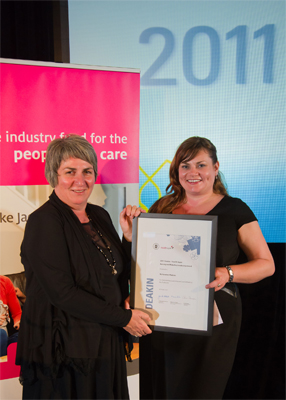Vanessa Watkins Maternity Care gets a Clean Bill of Health Interview

Vanessa Watkins Maternity Care gets a Clean Bill of Health Interview
Vanessa Watkins has significantly influenced the care of women at Eastern Health with a project that may well pave the way for national reform. Dedicated to the health field for 21 years, Vanessa has created a more collaborative health care framework and better options for women during pregnancy.For her efforts, Vanessa was recently honoured as the winner of the Deakin University - Health Super 2011 Leadership in Nursing and Midwifery Awards.
"Receiving national recognition hasn't come quickly - and it's fantastic," says Vanessa. She says the Award is also an acknowledgement of the people who have worked with her along the way. "They've shaped me into the clinician I am today."
According to Vanessa, the Award is also good for midwifery in general, because it demonstrates the contribution the profession can make. "Many people don't realise that a midwife can provide all the care that a woman with an uncomplicated pregnancy needs through her pregnancy, birth and beyond," she says. "If the midwife detects a potential complication, they will refer the woman to the appropriate clinician."
A richly rewarding career
Vanessa started her career as a health care assistant at a hospital in the United Kingdom in 1990. After completing nursing training, she spent 10 years working in trauma, orthopaedic and spinal nursing. When the opportunity arose in 2000, she began postgraduate midwifery training.
More than a decade later, Vanessa has never looked back. "Professionally, I've never been happier. A woman's experience of giving birth stays with her for the rest of her life. It's a privilege to share that transition to parenthood with women and their families."
A collaborative approach to maternity care
Vanessa moved to Australia in 2002 and began working at Eastern Health in 2003, where she has held the position of Clinical Midwife Consultant since 2009.
She soon recognised that a more collaborative approach by midwives and clinicians would improve the care of women during pregnancy and reduce the incidence of post-partum complications.
"Depending on her individual risk factors and needs, a pregnant woman may need assistance from a range of health care professionals, such as a midwife, GP, obstetrician, physiotherapist, diabetes educator, endocrinologist and/or intensive care team," she says.
"Effective collaboration is particularly important for women who move from low-risk to high-risk status, or from one birth site to another. Differing philosophies of care between clinicians may lead to miscommunication, tension, or even subversive behaviour."
smoother care pathway
After two years of planning, Vanessa and her colleagues began a six-month pilot of the Eastern Health Expected Pathways of Care for Pregnant Women project in June 2010.
The project developed an evidence-based care pathway for women expected to have uncomplicated pregnancies (known as the 'green' pathway). There were also clinical practice guidelines and quick-reference algorithms for changes that could increase a woman's risk, such as gestational diabetes.
In the event of these changes, Pathways included an expectation that the woman would be referred to the appropriate clinician, who would write a care plan so the woman could come in to labour with a hand-held record of what had been agreed.
Women with past complications that may not affect their current pregnancy were placed into an 'amber' pathway so they could be assessed early on. The 'red' pathway was designed for women with a pre-existing condition that could affect their pregnancy, such as hypertension. "These women need a management plan so that each practitioner who sees them gives consistent advice," Vanessa says.
The Pathways pilot also facilitated smoother escalation of care. "For example, if a midwife feels that a woman should see a consultant, they should be able to approach the consultant directly, instead of going through a junior doctor."
Vanessa's evaluation found that the pilot had improved cross-collaboration and care planning. These achievements are consistent with recommendations to facilitate a greater role for midwives in maternity care in the 2009 federal Department of Health and Ageing's Maternity Services Review.
Supporting professional development
An important part of the Pathways pilot was developing education packages to support professional development. This commitment continues. Vanessa works one-to-one to support midwifery and medical colleagues, and provides in-service education and workshops. She is also a member of the Eastern Health Clinical Practice Guideline committee, which helps implement national and international evidence-based practice at the local level.
Increasing safety for women
"The third stage of labour (after the baby's birth and before the placenta is born) is the riskiest time for women," says Vanessa. The uterus needs to contract properly straight after the placenta detaches, to ligate the vessels and stop haemorrhaging. "If practitioners manage the earlier stages of labour well," she says, "the uterus will contract fully and the risk of haemorrhage will be considerably lower."
Vanessa's work is paying dividends for women at Box Hill Hospital in particular, by halving the rate of severe post-partum haemorrhage (blood loss in excess of 1000 millilitres).
Improving practice locally and nationally
The Pathways program has become an ongoing part of professional practice at Eastern Health. "There is now an organisation-wide expectation that midwives will be able to work in their full scope of practice to provide high quality care for women with uncomplicated pregnancies," Vanessa says.
"Pathways has made significant inroads toward a functional and achievable model for collaboration in maternity care, based on mutual respect and understanding of the scope of professional practice for each group of clinicians."
The project has also generated wider interest. Vanessa has been invited to present project data at conferences in Australia and New Zealand. Her work has been recognised at a state level, and those in the know are keeping an eye on her as Australia looks to reform maternity care. The National Health and Medical Research Council and the federal Department of Health are promoting collaboration in maternity care as a priority for reform.
Broadening the evaluation of health care outcomes
As winner of the Deakin University - Health Super 2011 Leadership in Nursing and Midwifery Award, Vanessa receives $20,000 to put towards nursing education and professional development. She will use the prize to fund her PhD study of the ongoing Pathways program, building on the results of the initial pilot study.
She will undertake what's known as a 'realistic' evaluation - looking at what works, what doesn't, for whom, when, and why. This includes evaluating the outcomes for women, which wasn't feasible the first time around because the pilot program was shorter than the nine months of pregnancy. As part of her PhD studies, Vanessa also plans to travel to the United Kingdom to visit hospitals at the centre of innovations in maternity care.
Health Super offers low cost superannuation services to people working in the Health and Community Services sector.
Health Super is a division of First State Super - one of Australia's largest superannuation funds with over $30 billion in funds under management and around 750,000 members. Approximately 320,000 of our members work in the Health and Community Services sector.
Our super products and services are designed to meet the needs of our members throughout their working life and beyond.
Health Super offers a range of products including an Accumulation account ('super'), and Transition to Retirement and Account Based Pension accounts ('pension').
Our aim is to deliver consistent returns over the long-term to maximise the retirement savings of our members
In 2008, 2009 and 2010, Health Super was awarded a Platinum rating by SuperRatings, an independent research firm, ranking it among the top 15 per cent of superannuation funds in Australia.
Interview with Vanessa Watkins
Vanessa Watkins, Clinical Midwife Consultant, Eastern HealthQuestion: Can you talk about your project which has significantly influenced the care of women at Eastern Health?
Vanessa Watkins: The project I have been working on is to develop maternity care specific to women's needs. Our resources are trying to engage women in their maternity care so they can get the best possible care for them. We have developed Pathways of Care for Pregnant Women which is part of the public hospital care in Victoria so that when a women presents at a hospital she is connected with the right clinician for her needs. Most women that come into pregnancy are very well and their pregnancy is a normal, happy, planned and healthy event and the best people to provide care for them are midwifes who are able to support them through a normal life journey.
However some women who present in pregnancy have medical problems or they become unwell during pregnancy or there may be problems with the baby. The Pathways of Care for Pregnant Women fast tracks them to see the right doctors or specialists that they need.
Question: Can you explain how this award is great for midwifery in general?
Vanessa Watkins: It has turned maternity on its head because prior to that a woman would chose whoever she thought was best for and she may choose from a private midwife or a private obstetrician or it go through the public health system where you get who you're given. We are really trying to link women to the best person for them.
Question: How does it feel to win an award for the Expected Pathways of Care for Pregnant Women?
Vanessa Watkins: It is phenomenal. The Deakin University Health Super 2011 Leadership in Nursing and Midwifery Award is such a privilege and I am the first midwife to be recognised. This award is not just for midwifery but for nursing as well and because of that it is amazing. It is an acknowledgement of the hard work we have been doing; as you know it's not just me, there are a whole bunch of people behind the scenes who make this project work. The award is a huge recognition and I am very proud for Eastern Health, as well.
Question: What do you plan to do with the prizes, from the Deakin University - Health Super 2011 Leadership in Nursing and Midwifery Award?
Vanessa Watkins: What we've done with the project, at the moment, is streamline care for women with a healthy pregnancy so we have looked at normal pregnancy and the next part is to actually look at how we can prove care for women with complications during their pregnancy.
The project has a traffic light system. A Green Pathway is a normal healthy care pregnancy pathway and a Red Pathway is a more complex system of pregnancy care.
It is about looking at developing critical care services for maternity and I am travelling to the UK in May, 2012, to attend a Patient Safety Conference whilst also linking in with different innovative across the UK because they have done some really great work in regards to maternity in the UK. In the UK I will be able to greet colleagues, across the globe, I can learn from them and we can share our experiences.
I am also doing a pHd (laughs) in my spare time. My pHd is around how we can improve maternity care, I am looking at how care pathways help collaborations with women and with doctors and midwifes because there has been tension between doctors and midwifes in the past.
My aim is to make it safer and healthier for everyone.
Question: Do you have a case study for the positives of Expected Pathways of Care for Pregnant Women?
Vanessa Watkins: Due to patient confidentiality I cannot go into detail about patients but we did conduct a pilot study to look at turning maternity on its head; instead of being about the clinicians we have put it about women and we have piloted it at two of our hospitals and a family birthing centre of Eastern Health for six months to look at the tools we gave the clinicians (doctors and midwifes) to work with. We did this pilot study to see if the tools were user friendly and how they were perceived by the women the clinicians were working with. The results came back really, really positive and they rated the Pathways of Care for Pregnant Women project as something that was really going to improve the collaboration between doctors, midwifes and women whilst also making the job safer and improving communication and education. They also believed that the Pathways of Care for Pregnant Women project provided more information for women to make decisions about their own care.
The pilot study was very successful and we are very happy with it. We have rolled out the study right across Eastern Health now and we are continuing to evolve the project to engage women much more formally in the survey to get their feedback because it is all about them.
Question: What inspired you career in midwifery?
Vanessa Watkins: When I was 8 and was asked what I wanted to be when I grew up I would always say "a midwife" and I also wanted to have 6 children.
I now have two children, I stopped at two, I didn't go for the full six.
I always wanted to be a midwife but I actually started my career as a nurse because when I started my career in the UK you couldn't directly study midwifery, you had to do your nurse training and then start midwifery; pretty soon after the rules changed and it was harder once you were a nurse to train in midwifery, you had to return to University for four years and by that stage I had a mortgage and I couldn't do it.
It wasn't until I moved cities that I could get into a course to study midwifery at University and I have never looked back. I loved my nursing career where I looked after people who had massive car accidents but midwifery is what I am meant to be doing.
Question: Can you talk about a typical day on the job?
Vanessa Watkins: I spend about half my time working clinically so there is no typical day. The most wonderful thing about maternity is I can be working in a clinic and then I may have to move into the labour ward because a lady in labour has arrived and I need to care for her. Whether she wants to be in a bath, have a water birth or any complex needs need to be met. You never know what is coming through the door, I am always on my toes and there is no typical day in midwifery.
Interview by Brooke Hunter
MORE
- Midwife Cath Interview
- Colin Anson Interview
- Why Good Health is Essential to Increase Fertility
- 5 Beauty Products to Avoid When You are Pregnant
- Looking After You, Looking After Your Baby
- Andre Carvalho International Pregnancy and...
- NRL Player v Mums
- Safer Internet Day
- The Pink Elephants Support
- Edwina Sharrock Birth Beat Interview
- Make Mums Group Dad-Friendly



